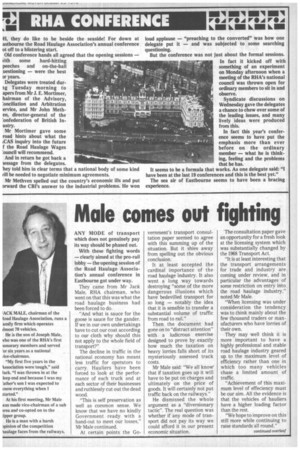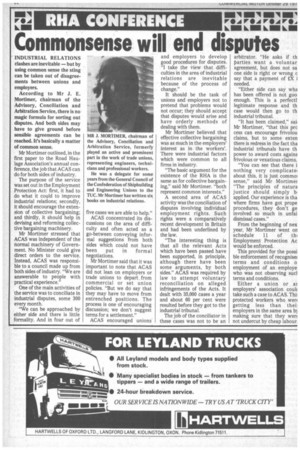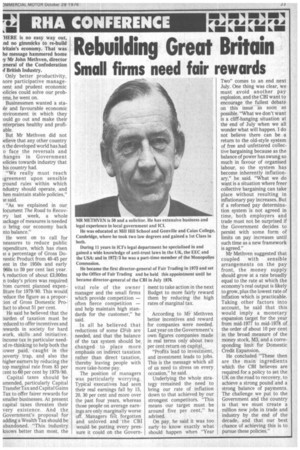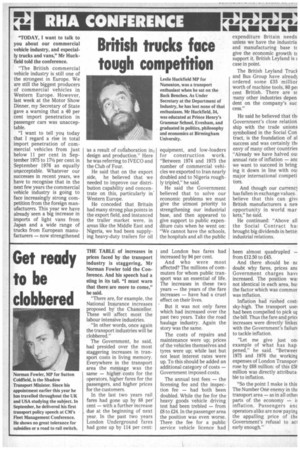Male comes out fighting
Page 23

Page 24

Page 25

Page 26

If you've noticed an error in this article please click here to report it so we can fix it.
ANY MODE of transport which does not genuinely pay its way should be phased out.
With these fighting words — clearly aimed at the pro-rail lobby — the opening session of the Road Haulage Association's annual conference in Eastbourne got under way.
They came from Mr lack Male, RHA chairman, who went on that this was what the road haulage business had been forced to do.
"And what is sauce for the goose is sauce for the gander. If we in our own undertakings have to cut our coat according to our cloth why should this not apply to the whole field of transport?"
The decline in traffic in the national economy has meant less traffic for operators to carry. Hauliers have been forced to look at the performance of each truck and at each sector of their businesses and ruthlessly cut out the dead wood.
"This is self preservation as well as common sense. We know that we have no kindly Government ready with a hand-out to meet our losses," Mr Male continued.
At certain points the Go vernment's transport consultation paper seemed to agree with this summing up of the situation. But it shies away from spelling out the obvious conclusion.
It at least accepted the cardinal importance of the road haulage 'industry. It also went a long way towards destroying "sOme of the more dangerous illusions which have bedevilled transport for so long — notably the idea that it is sensible to transfer a substantial volume of traffic from road to rail."
Then the document had gone on to "distract attention" with a ludicrous exercise designed to prove by exactly how much the taxation on heavy lorries falls short of its mysteriously assessed track costs.
Mr Male said: "We all know' that if taxation goes up it will have to be put on charges and ultimately on the price of goods. It will certainly not put traffic back on the railways."
He dismissed the whole argument as a "diversionary tactic". The real question was whether if any mode of transport did not pay its way we could afford it in our present economic situation. The consultation paper gave an opportunity for a fresh look at the licensing system which was substantially changed by the 1968 Transport Act.
"It is at least interesting that the transport arrangements for trade and industry are coming under review, and in particular the advantages of some restriction on entry into the road haulage industry," noted Mr Male.
"When licensing was under consideration the tendency was to think mainly about the few thousand traders or manufacturers who have lorries of their own.
They may well think it is more important to have a highly professional and stable road haulage industry geared up to the maximum level of efficiency rather than one in which too many vehicles chase a limited amount of traffic.
"Achievement of this maximum level of effeciency must be our aim. All the evidence is that the vehicles of hauliers have a higher loading factor than the rest.
"We hope to improve on this still more while continuing to raise standards all round."
Commonsense will end disputes
INDUSTRIAL RELATIONS clashes are inevitable — but by using common sense the sting can be taken out of disagreements between unions and employers.
According to Mr J. E. Mortimer, chairman of the Advisory, Conciliation and Arbitration Service, there is no magic formula for sorting out disputes. And both sides may have to give ground before sensible agreements can be reached. It's basically a matter of common sense.
Mr Mortimer outlined, in the first paper to the Road Haulage Association's annual conference, the job that ACAS can do for both sides of industry.
The purpose of the service was set out in the Employment Protection Act: first, it had to do what it could to improve industrial relations; secondly, it should encourage the extension of collective bargaining; and thirdly, it should help in devising and reforming collective bargaining machinery.
Mr Mortimer stressed that ACAS was independent of the normal machinery of Government. No Minister could give direct orders to the service. Instead, ACAS was responsible to a council made up from both sides of industry. "We are answerable to people with practical experience."
One of the main activities of the service was to conciliate in industrial disputes, some 300 every month.
"We can be approached by either side and there is little formality. And in four out of five cases we are able to help."
ACAS concentrated its discussions on the area of difficulty and often acted as a go-between conveying informal suggestions from both sides which could not have been put in formal negotiations.
Mr Mortimer said that it was important to note that ACAS did not lean on employers or trade unions to depart from commercial or set union policies. "But we do say that they may have to move from entrenched positions. The process is one of encouraging discussion; we don't suggest terms for a settlement."
ACAS encouraged unions and employers to develop good procedures for disputes. "I take the view that difficulties in the area of industrial relations are inevitable because of the process of change."
It should be the task of unions and employers not to pretend that problems would not occur; they should accept that disputes would arise and have orderly methods of dealing with them.
Mr Mortimer believed that effective collective bargaining was as much in the employers' interest as in the workers'. There were industrial factors which were common to all firms in industry.
"The basic argument for the existence of the RHA is the same as for collective bargaining," said Mr Mortimer. "both represent common interests."
A second area of ACAS activity was the conciliation of disputes involving individual employment rights. Such rights were a comparatively recent development in Britain and had been underlined by the law.
"The interesting thing is that all the relevant Acts which have been passed have been supported, in principle, although there have been some arguments, by both sides." ACAS was required by law to attempt voluntary reconciliation on alleged infringements of the Acts. It dealt with 35,000 cases a year and about 60 per cent were resulted before they got to the industrial tribunal.
The job of the conciliator in these cases was not to be an arbitrator. "He asks if th parties want a voluntar agreement, but does not sa one side is right or wrong o say that a payment of EX i needed.
"Either side can say who has been offered is not goo enough. This is a perfectl legitimate response and th case would then go to th industrial tribunal.
"It has been claimed," sai, Mr Mortimer, "that this pro cess can encourage frivolou claims, but to some exten there is redress in the fact tha industrial tribunals have th power to award costs agains frivolous or vexatious claims.
"You can see that there i nothing very complicatei about this, it is just cornmoi sense," said Mr Mortimer "The principles of natura justice should simply 13, applied. Our experience is tha where firms have got prope procedures, they don't ge involved so much in unfai dismissal cases."
From the beginning of nex year, Mr Mortimer went on schedule 11 of OD Employment Protection Ac would be enforced.
This provided for the possi ble enforcement of recognise( terms and conditions o employment of an employe who was not observing suet terms and conditions.
Either a union or at employers' association caul( take such a case to ACAS. Thi: protected workers who wer( getting less than theii employers in the same area 133 making sure that they wer( not undercut by cheap labour.
Rebuilding Great Britain
Small firms need fair rewards
'HERE is no easy way out, Ind no gimmicks to re-build iritain's economy. That was he message hammered home ly Mr John Methven, director ;eneral of the Confederation a British Industry.
Only better productivity, nore participative managenent and prudent economic iolicies could solve our probems, he went on.
Businessmen wanted a sta)1e and favourable economic ,nvironment in which they :ould go out and make their !nterprises healthy and profiable.
But Mr Methven did not )elieve that any other country n the developed world has had o face the reversals and :hanges in Government iolicies towards industry that his country had.
"We really must reach igreement upon sensible ;round rules within which ndustry should operate, and hen maintain stable policies," le said.
"As we explained in our locument The Road to Recov?ry last week, a whole mckage of measures is needed .o bring our economy back nto balance."
He went on to call for measures to reduce public .ixpenditure, which has risen is a percentage of Gross Domestic Product from 40-45 per :ent in the 1950s and early 960s to 59 per cent last year. ti reduction of about 0,000m n today's prices was required 'rom current planned expeniiture for 1979/80. This would 'educe the figure as a proportion of Gross Domestic Pro' iuct to about 51 per cent.
He said he believed that the burden of taxation must be reduced to offer incentives and rewards in society for hard work, skills and initiative. Income tax in particular needad re-thinking to help both the lower paid, caught in the poverty trap, and also the higher earners by reducing the top marginal rate from 83 per cent to 60 per cent by 1979/80.
Capital taxes should be amended, particularly Capital Transfer Tax and Capital Gains Tax to offer fairer rewards for smaller businesses. At present capital taxes threaten their very existence. And the Government's proposal for adding a Wealth Tax should be abandoned. "This industry knows better than most, the
MR METHVEN is 50 and a solicitor. He has extensive business and legal experience in local government and ICI.
He was educated at Mill Hill School and Gonville and Caius College, Cambridge, where he took two law degrees and gained a 1st Class in both.
During 11 years in ICI's legal department he specialised in and gained a wide knowledge of anti-trust laws in the UK, the EEC and the USA: and in 1972/3 he was a part-time member of the Monopolies Commssion.
He became the first director-general of Fair Trading in 1973 and set up the Office of Fair Trading and he held this appointment until he became director-general of the CBI in July 1976.
vital role of the owner manager and the small firms which provide competition — often fierce competition — and help maintain high standards for the customer," he said.
In all he believed that reductions of some E31/2b are needed, and that the balance of the tax system should be changed to place more emphasis on indirect taxation rather than direct taxation, thereby leaving people with more take-home pay.
The position of managers was particularly worrying. Typical executives had seen their real earnings fall by 15, 20, 30 per cent and more over the past four years, whereas those people on average earnings are only marginally worse off. Managers fell forgotten and unloved and the CBI would be putting every pressure it could on the Govern ment to take action in the next Budget to more fairly reward them by reducing the high rates of marginal tax.
According to Mr Methven better incentives and reward for companies were needed. Last year on the Government's own figures companies made in real terms only about two per cent return on capital._ "Profits lead to investment, and investment leads to jobs. This is the message which all of us need to stress on every occasion," he said.
Underlying the whole strategy remained the need to bring our rate of inflation down to that achieved by our strongest competitors. "This means our target must be around five per cent," he advised.
On pay, he said it was too early to know exactly what should happen when "Year Two" comes to an end next July. One thing was clear, we must avoid another pay explosion, and the CBI want to encourage the fullest debate on this issue as soon as possible. "What we don't want is a cliff-hanging situation at the end of July when we all wonder what will happen. I do not believe there can be a return to the old-style system of free and unfettered collective bargaining because as the balance of power has swung so much in favour of organised labour, so the system has become inherently inflationary," he said. "What we do want is a situation where freer collective bargaining can take place without resulting in inflationary pay increases. But if a reformed pay determination system is not agreed in time, both employers and trade must not be surprised if the Government decides to persist with some form of limits on pay increases until such time as a new framework is agreed."
Mr Methven suggested that coupled with sensible arrangements on the pay front, the money supply should grow at a rate broadly equal to the rate at which the economy's real output is likely to grow, plus the lowest rate of inflation which is practicable. Taking other factors into account, he said that this would imply a monetary expansion target for the year from mid-1977 to mid-1978 of the order of about 10 per cent in the broad measure of the money stock, M3, and a corresponding limit for Domestic Credit Expansion.
He concluded "These then are the main ingredients which the CBI believes are required for a policy to set the UK on the road to recovery, to achieve a strong pound and a strong balance of payments. The challenge we put to the Government and the country is that we must create a million new jobs in trade and industry by the end of the decade, and that our best chance of achieving this is to pursue these policies."
British trucks face tough competition
' "TODAY, I want to talk to you about our commercial vehicle industry, and especially trucks and vans," Mr Huckfield told the conference.
"The British commercial vehicle industry is still one of the strongest in Europe. We are still the biggest producers of commercial vehicles in Western Europe. However, last week at the Motor Show Dinner, my Secretary of State gave a warning that a 40 per cent import penetration in passenger cars was unacceptable.
"I want to tell you today that I regard a rise in total import penetration of commercial vehicles from just below 11 per cent in September 1975 to 171/2 per cent in September 1976 as equally unacceptable. Whatever our successes in recent years, we have to recognise that in the next few years the commercial vehicle industry is going to face increasingly strong competition from the foreign manufacturers. This year we have already seen a big increase in imports of light vans from Japan and a wide range of trucks from European manufacturers — now strengthened as a result of collaboration in I design and production." Here he was referring to IVECO and the Club of Four.
He said that on the export side, he believed that we needed to improve our distribution capability and concen-. trate on this, particularly in Western Europe.
He conceded that Britain had many strong plus points in the export field, and instanced the trailer market were, in areas like the Middle East and Nigeria, we had been supplying heavy-duty trailers for oil Leslie Huckfield MP for Nuneaton, was a transport enthusiast when he sat on the Back Benches. As Under Secretary at the Department of Industry, he has lost none of that enthusiasm. Mr Huckfieid, 34, was educated at Prince Henry's Grammar School, Evesham, and graduated in politics, philosophy and economics at Birmingham University.
equipment, and low-loaders for construction work. "Between 1974 and 1975 the number of commercial vehicles we exported to Iran nearly doubled and to Nigeria roughly tripled," he said.
He said the Government believed that to solve our economic problems we must give the utmost priority to strengthening our industrial base, and then appeared to give support to public expenditure cuts when he went on: "We cannot have the schools, the hospitals and all the public expenditure Britain needs unless we have the industria and manufacturing base t( give the economic growth tic support it. British Leyland is e case in point.
The British Leyland Truct and Bus Group have alreat ordered some -£35 millior worth of machine tools, 80 pei cent British. There are sc many other industries depen dent on the company's sue cess."
He said he believed that thi Government's close relation ship with the trade unions symbolised in the Social Con tract, is the foundation of al success and was certainly the envy of many other countries "Already we have halved oui annual rate of inflation — anc we want to succeed in bring ing it down in tine with ow major international competi tors.
And though our currenc3 has fallen in exchange values. believe that this can give British manufacturers a new opportunity in world mar kets," he Said.
He continued: "Above all the Social Contract ha: brought big dividends in bettel industrial relations.








































































































